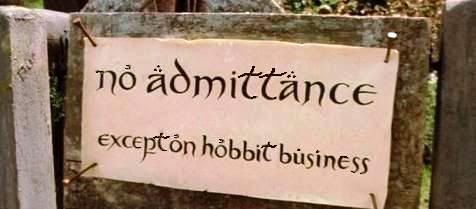
|
|
 |


|
|
|
|
|
|
|
|
|
|
|


News from Bree
spymaster@theonering.net
Dec 16 2014, 8:04am
Post #1 of 5
(1763 views)
Shortcut
|
|
Peter Jackson talks 'Hobbit: Battle of the the Five Armies' and all Middle-earth with TheOneRing.net
|
Can't Post
|
|
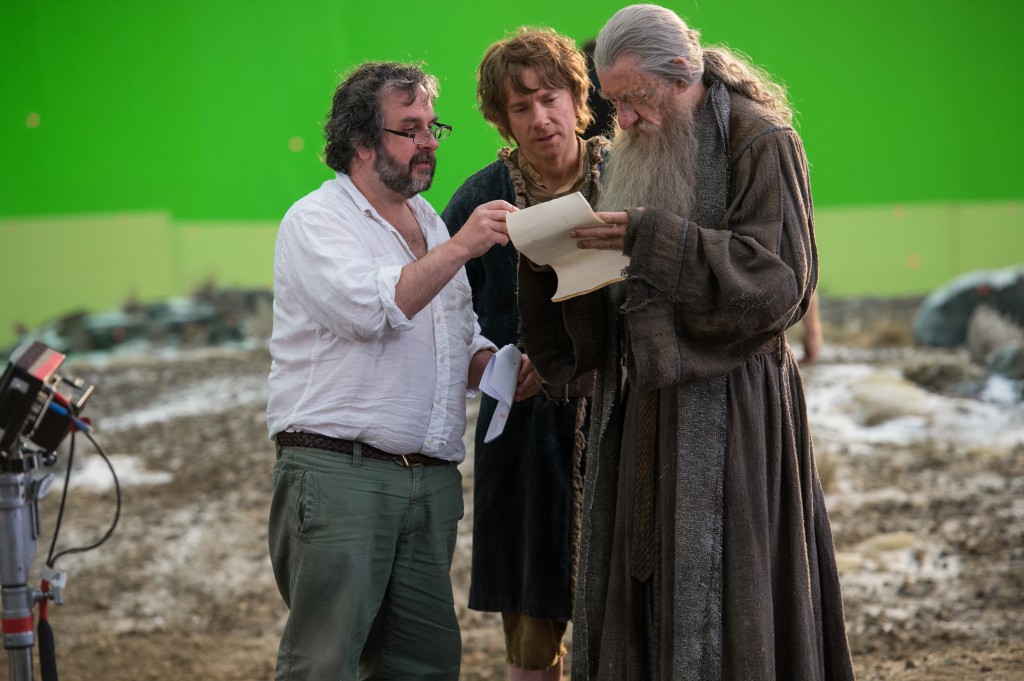
MIRAMAR, New Zealand: The director's tent. Inside a sound stage or outside on location, it is a constant and central fixture on a movie shoot. It is home base for Peter Jackson and his team.
It is sacred ground - well almost.
The decisions made inside it, by the team, under Jackson's direction, are crucial to the project where it is determined what will later happen in front of the camera.
So every day, whatever happens to a set or a soundstage overnight, the tent is there set up and waiting for the core of the shooting unit.
Editor Jabez Olssen, Script Supervisor Victoria Sullivan and First Assistant Director Carolynne Cunningham call it home during the shoot. Cunningham is out a lot, Olssen and Sullivan less so and Producer Zane Weiner is always near. Jackson's assistant Sebastian Meek is in and out at all times, bringing badly needed tea and watching the door from outside to eliminate distractions inside.
Jackson lives on tea and Meek has a talent for having it handy at the perfect moment.
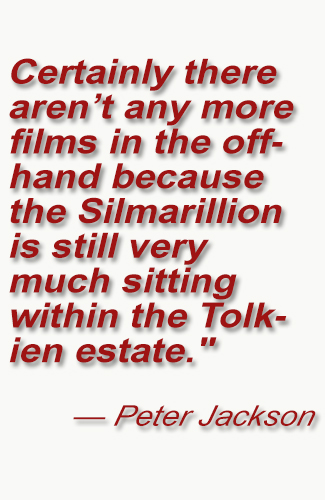 SETTING THE SCENE SETTING THE SCENE
In April, 2012, as a representative of fandom via TheOneRing.net, to be on set during five weeks of the filming of the Hobbit films. At the time, it was still scheduled to be two movies and the production had just settled in to shoot in studio instead of on location. Much was unknown then, that now is completely familiar to fans.
When I first arrived at Stone Street Studios, the publicity team took me to set, showed me the ropes and left me to my own devices during the rest of my stay to meet folks and get interviews, which was great. No time and no need for babysitting.
I was there to be a good guest and to observe. Two weeks later I was definitely convinced I had no chance of talking to Peter Jackson, except for an occasional, "Hello, how are you getting on?"� from him during my time there.
Fans world-wide know from production diaries, how exhausted Jackson gets during the shooting phase of filmmaking. It is important to really understand why.
Peter Jackson is a busy guy. Particularly when he is shooting, there is a lot to do in a day and a lot of people that need to understand his vision in order to do their jobs well; he is the hub of the great spinning wheel.
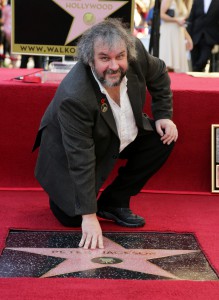
He is the director, a writer and a producer - each a big job on its own. Many films have one of each of those, or several of some, all working together. But Jackson was all of them at once and combining titles didn't mean there was less work to be done. Just because he was reviewing shots didn't mean the script didn't need his touch or that the art department didn't need his input as a director or the next day's schedule didn't need approval. Others were partners on all of these fronts but they also required Jackson.
In a day he might need to meet with the effects supervisor, set designers, concept designers, costume designers, the composer or see actual costumes for approval or changes to name just a few of the many things that require his time. He will confirm the schedule with his Assistant Director, producers and spend time with the Second Unit Director Andy Serkis to make sure all is to his liking. They need sets built, greens grown, sets decorated, concept guys working ahead, materials guys building everything, maximizing actors' time, feeding all of those people, screening extras, bringing in the right number of prosthetic artists and on and on. In short, there is never a shortage of people who need Jackson's input to work on his vision and it takes the logistics of, dare I say, planning a battle with five armies.
In short, he has to sign off on pretty much everything.
Those are the reasons "The Hobbit: The Desolation of Smaug", and his other Hobbit movies are genuinely Peter Jackson movies. It also means he is booked.
Solid.
THE FINAL HOURS
And so it was, the last day of my time on The Hobbit set, after several assurances that it would happen - it did.
Lunch happened and on the location set of Dale, up on a hill, I was invited to that director's tent to sit and talk with PJ, just the two of us alone. (One editor asked me if we ate together in the tent but I don't think so, but why many memories are crystal clear of that meeting, I just have no idea.)
I had been inside before, but not often. The day I shadowed him, I spent several hours, trying to melt into the background. This was his sanctuary and office.
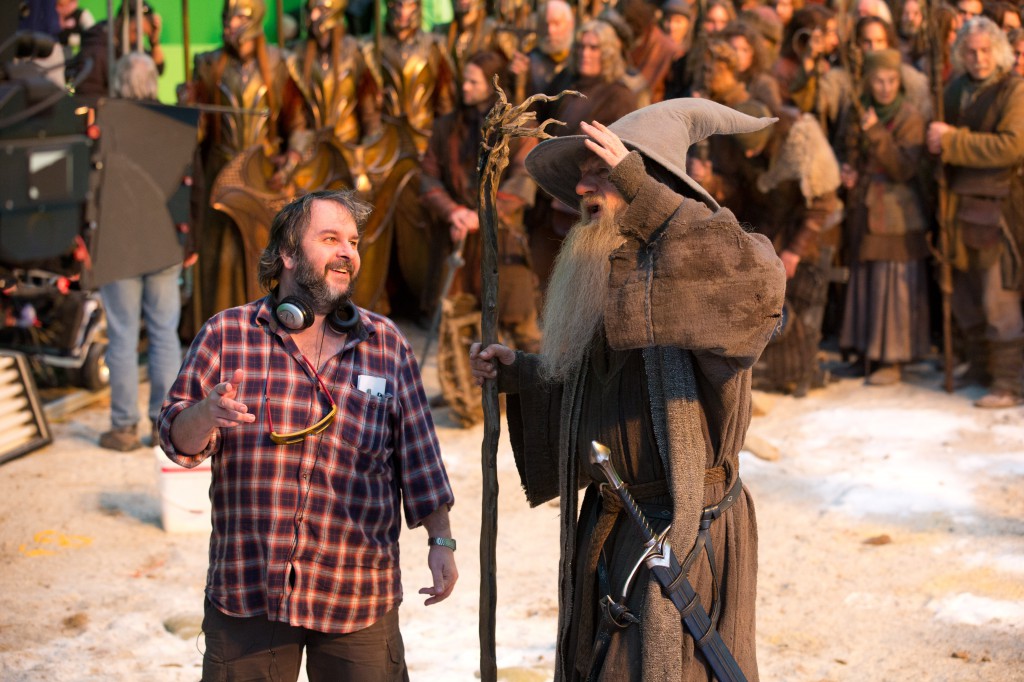
THE HOBBIT: THE BATTLE OF THE FIVE ARMIES
Long before the film was called "The Battle of the Five Armies", it was obvious that there was a great, big battle in the film. Jackson, since his work on Rings, has been much copied in style and substance for his battle sequences. It isn't a stretch to say that with "The Two Towers"� and "Return of the King",� he set the standard for other would-be epic battle films.
So a decade later, how did Jackson approach these battles?
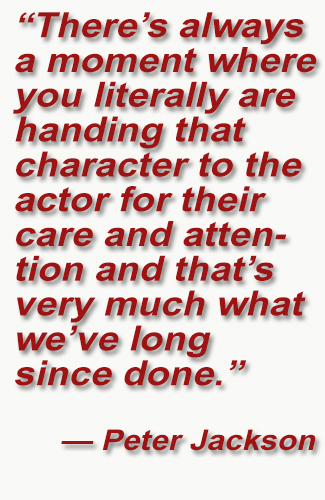 "Well, battles in a way, they have a personality and a characteristic of their own based on who's participating in the battles, what the goal is, what the location is, who the armies are."� "Well, battles in a way, they have a personality and a characteristic of their own based on who's participating in the battles, what the goal is, what the location is, who the armies are."�
One ability Jackson has is to give the audience a clear sense of geography, place and character during epic, action packed sequences. This is rarer than you might think. The audience understands what is going on in the big picture and where the main characters are in that landscape. Nowhere is that better handled than the siege of Helm's Deep. To my delight, as a personal favorite, it is the first fight he mentions.
"When you think about Helms Deep, which I think has a very distinctive feel - it's not really distinctive because there's an Elf fighting an Orc - its distinctive because of the fortress, the valley, the rain, the lightning, the noise, the sound effects, the drums.
"You try to create a personality for a battle because at the end of the day, a battle is guys whacking each other with swords and axes,"� he said.
"What's important is the entire vibe and the buildup and the kind of the atmosphere. So the Battle of the Five Armies certainly has a very specific quality to it and a very specific buildup to it.
"The Elves and the Men are going to fight the Dwarves and you've suddenly got these characters and the people that you respect that you've followed who are going to be starting to have a crack at each other and so it will have a very different feel and personality as a battle scene than anything that we've done before."
SHOOTING THE MOVIES
One thing I heard a lot of on set, from people around Jackson, was that he was in fine form. The production was in a rhythm and he was in a special place as a shooting director. Did Jackson feel that too.
He was thoughtful in his answer. "Yeah, I do. It's been one of the most surprising things actually, because there was a certain sense of duty of how I ended up doing this movie."
Long-time readers of TheOneRing.net will recall that there were several times when it felt like the Hobbit wouldn't make it to the silver screen. Labor conflict, studio struggles, rights issues and eventually the loss of the man Jackson picked to direct, Guillermo del Toro. He had to drop because the production couldn't get started.
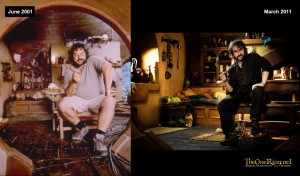
"I just got a sense of obligation I have to say, a sense of duty. The quickest and most efficient way to move forward with this, you know if it was happening, because when Guillermo left, there was still no sense that the film was ever going to get a green light, that I should just do it. So that was my history into it.
"I've been surprised at how much I've enjoyed it. I'm so incredibly pleased that I'm doing it now. Which, two years ago if you asked me that, I wouldn't have said that but I'm happy, I'm enjoying myself. It's fun."
One of the mental abilities that makes Jackson different from most people is his ability to think both big and little. He can see the big picture and he can see the little details and how they will matter in a scene and how they figure in a full film or film trilogy.
But when he shoots, does the shoot feel like one big project or does he break it up mentally?
"Well, it's always one big thing because the schedule is so mixed up. As you know, the day before yesterday we were shooting the second movie, yesterday we're shooting first movie, today we've got the second film again. So, you end up not differentiating it in terms of the production."
That is Jackson thinking and seeing the big picture. Now, here he is with the subtleties.
"But you know, I can feel in a sense a very different vibe in the movies.
"I mean, the first film is very much a road movie and adventure film as the title says - An Unexpected Journey - and it is the journey.
"Whereas in (later) movies, they're really into a very regional situation with Lake Town and Erebor and Dale. That kind of is geographically a much smaller area and they're just dropped right into the middle, so you're dealing a lot more with suspense and tension and characters."
It is the characters that drive any Jackson film and as everybody knew from the beginning, this particular film is full of them.
CUTTING REMARKS
"Now, in every film I've ever made, scenes get cut because you tend to write more than what you really need."
But fans, many fans, feel that Jackson's extended editions of the films are the definitive ones.
"It may be a brilliant, beautiful scene and yet it's just irrelevant. You can do without it so you usually get to a stage in a film where you need to cut time out and you just have to look for what you can do without."
But that doesn't mean he shoots with the extended scene in mind.
"...as far as I'm concerned everything we're shooting is for the movie - for the theatrical movie," he said. I probe to make sure he meant that and that I understood it. I look for a contradiction but don't get one.

"I mean, they are all very legitimate scenes that exist in the body of the story. We don't shoot them as being bonus scenes, we don't shoot them knowing that they're going to be in an extended cut at all. We just end up trying to shave running time off the movie and get those bits whether they're short or long or just fragments or entire sequences, those pieces can - I always love putting them back again because it pains me to take anything out. The extended cuts have reduced that pain."
It wasn't an exaggeration to say that as an interviewer in the tent, literally outside the ruins of the gates of Dale, I was hyper aware of time. I was delighted by Jackson's transparent answers but I knew a few long answers meant it would cost me some questions. There were essential, "must ask"� themes but I was thrilled when the conversation turned to the extended editions of the films. Fans want to know about them but journalists from more mainstream publications might not even be aware of them. The EEs are a bit of a passion concept for me but if I didn't ask, maybe nobody would.
As TheOneRing.net readers and careful watchers of the LOTR DVDs know, there is much more material conceived and shot for the fabled "Ultimate Version"� of the Rings films. While Jackson may feel differently now than he did during the shoot, he was happy to entertain the idea of revisiting what I think of as the mythical, rainbow-colored-unicorn-edition, with the architect of the extended home video content on Jackson's movies, Michael Pellerin, a great filmmaker on his own, working in tandem with Jackson.
THE HOBBIT MOVIE - SURPRISE!
I wondered, if during the long shooting process, there was anything new for the man who had the grand concept, put together the production, co-wrote the script, approved everything along the way, cast the actors and then shot the film. So, any surprises?
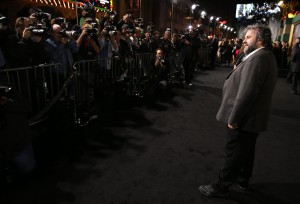
"There always are,"� Jackson said. "What is always surprising is what everybody else brings to the process so you know, in order to imagine my version of the scene, I have to essentially design the set to figure out where everyone's going to be before I can put it together and so I do, I sort of do that in my head." (Um, wow!)
"When Alan Lee and John Howe and Dan Hennah come on board, their sets always look a hell of lot better than the ones that were in my head and then when Ian and Martin and everyone is doing the performances, they're bringing things into it that I never imagined in my vision of the film. So, you know, my little imaginary version that I paste together always gets built on and improved by the contributions of everyone else and that's what's exciting.
"That's what makes every day different because there is never a day where you literally show up and you're just shooting what you had in your head. You have a thing in your head but you can never actually duplicate that and the idea is to try to improve it.
"So you're always looking for opportunities to make it better and one of the things I always try and do when I'm looking at the monitors and directing and we're in the middle of a scene and we're in the middle of shooting a shot - the thing that I'm always saying to myself is now what could we do to improve this? What can we do to improve it? How do we make it better? And anything that I give in way of a direction to an actor or a cameraman is because I'm trying to think of ways to improve what I'm seeing and so it's always sort of trying to push, push, push all the time."
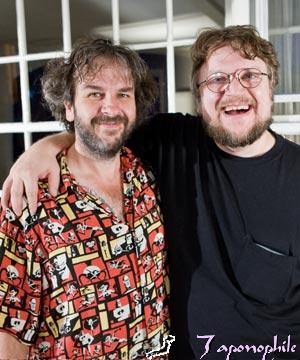
Photo courtesty of Stuff.co.nz
Most readers will know Jackson and company are infamous for changing scripts overnight. This isn't standard filmmaking practice - far from it - so why?
"(It's) just wanting to make the film as good as we can.
"To me it's a no-brainer. You write something a year ago, you pick it up today and you think, 'Well you know we thought this was good at the time but we got a lot more ideas now and we can make it a lot better.' You know I think you're insane if you think a script is finished and it sits as a sort of a monument to 18 months ago when it was originally written.
"It should be organic, it should develop and change and adapt to the flow of the film. We see characters and moments coming to life in scenes that we shoot and we think wow, we could do more with that character or we could do more with that tension that's building or we could do more with that and so we're kind of always adapting the script to sort of the flow of what we're shooting to kind of keep pushing it and making it as good as it can be."
And then Jackson talks about something that makes him different from virtually every director in Hollywood while speaking of the ever evolving script.
"They're not always new scenes but sometimes you're expanding a scene or you're bringing a new character into a scene that wasn't originally in the scene. It and it keeps someone like Caro (Carolynne Cunningham, First Assistant Director) on her toes all the time, because you know it is a very organic process - films are not supposed to be. You're supposed to lock off your script, do your schedule, do your budget and that's what you shoot but that's not the way that Fran and I work. We just never had worked like that."

ACTORS
So what about these actors then? From Jackson's early career when he cast the unknown Kate Winslet in 1994's "Heavenly Creatures", - a film that was a major stepping stone to her international stardom and Academy Award recognition - to his eventual pitch-perfect Rings cast, with another stellar bunch for Hobbit films, he gets essential casting right.
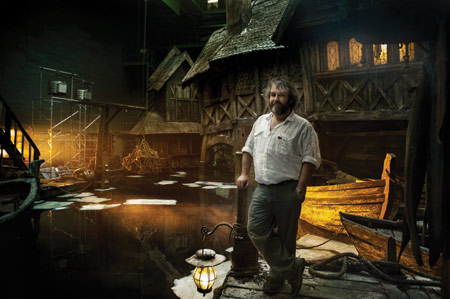
Peter Jackson stands on the set of Lake-Town
But this film with its Elves and Dwarves and Wizards and Hobbits and Men was a tough challenge. Bilbo had to perfect. Smaug had to be just right. Thorin Oakenshield required some specific balance and a complex performance.
'
"We have a great group of actors,"� he said. "You know at the end of the day you can write a character and you can imagine a particular personality or a sense of what this character is like but there's always a moment - and this happens with any character that we ever write, no matter whether it's a leading character or a small character - there's always a moment where you literally are handing that character to the actor for their care and attention and that's very much what we've long since done."
But what about that large group of dwarves?
"You probably could dig out old interviews I was doing during "The Lord of the Rings" press time when people would say: 'So are you going to move on to The Hobbit next?' And it was always the 13 dwarves that terrified me, because how do you structure a movie and structure scenes around such a large ensemble? But I think we've done it and I think we've done it in a very entertaining way.
"There is a point where they put their makeup on and they put their fat suits on and they put their wardrobe on and you're literally saying: 'You're in charge of this character now. You're in charge of Dori or you're in charge of Oin or you're in charge or Ori' and it leaves my hands to some degree. We've just got a great group of people who are making those characters and bringing them to life."
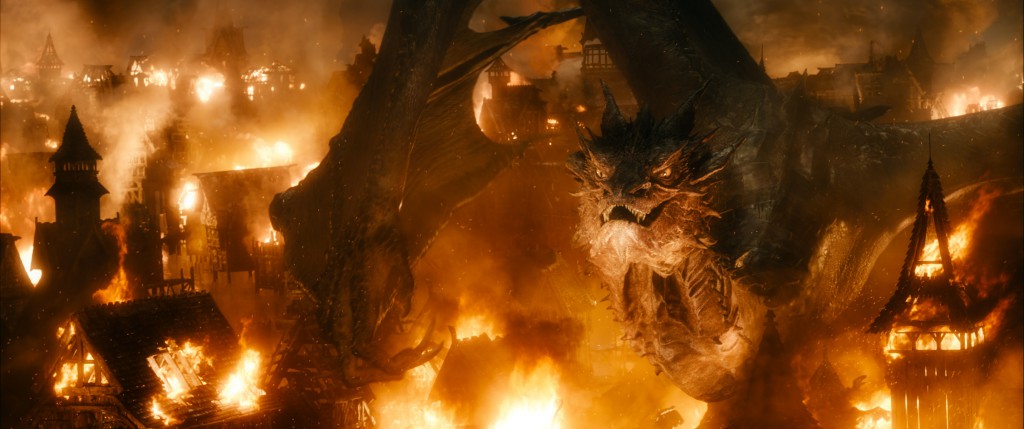
THE DRAGON
Another crucial part of two of the three films deal with perhaps the most influential character in J.R.R. Tolkien's literature, the dragon Smaug. Often imitated, he filtered through popular culture, leaving his mark on everything from Dungeons & Dragons to other contemporary cinema. Smaug made a template so widely used that he became the dragon.
"Well, in a funny way I don't think it's as much about what he looks like, I mean, obviously he's a dragon so you know, you're going to be working in the world of a dragon design but it's his personality, his character, he has to be scary."
And, we as an audience aren't done with him. He has a big, hot job in the final film as well.
"I wanted to have somebody who is a truly commanding presence, who is unpredictable, slightly psychotic and that way, you don't know whether you trust him or not and he's seductive. You know, there's a personality there that is, to me, that quality and the way that the audience feels when in the Smaug scenes is a lot more important than what he actually looks like."
Benedict Cumberbatch and Weta Digital seem to have met the demands of the character who is yet to be seen as the flying furnace and mechanism of annihilation that he is.
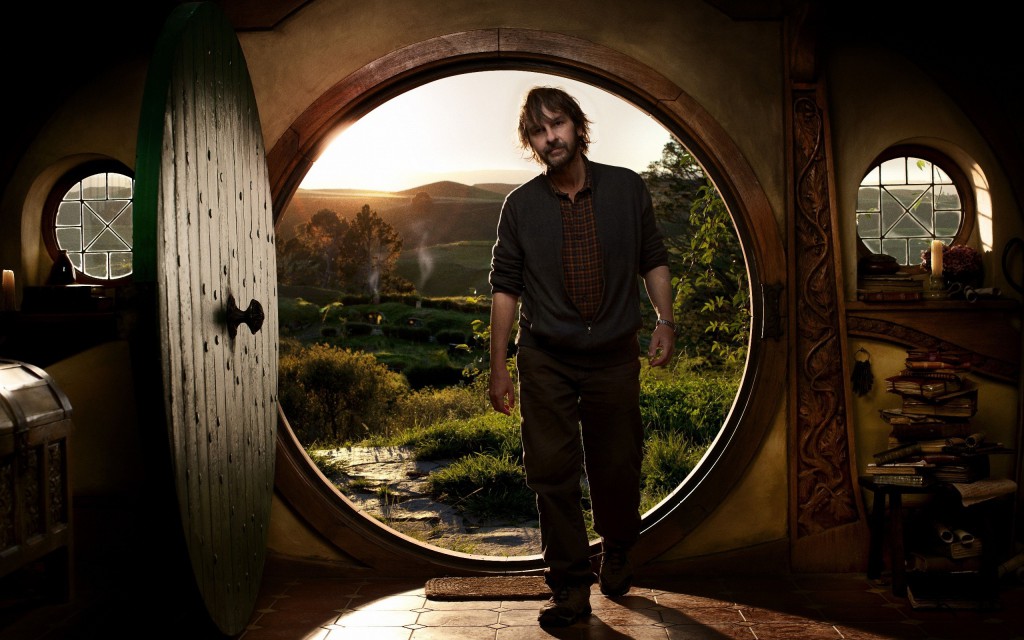
MOTION AND MOVEMENT COACHING
Smaug of course is animated while his movements are famously done by motion capture, via Cumberbatch as adapted by Weta Digital. Middle-earth films advanced this science and art in the last decade as much as any film or set of films. The folks working on Jackson's film are pioneers. Andy Serkis, a key figure, advanced the process and it was heavily used on Hobbit films as well. Serkis was of course, directing the second unit when he wasn't (for a week) reprising his role as Gollum.
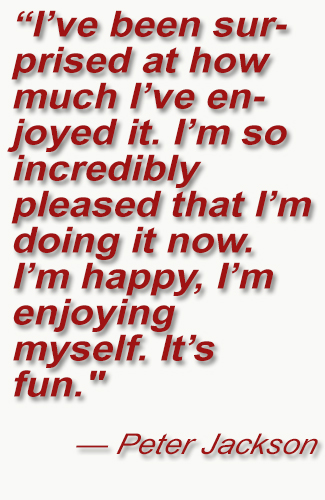
Jackson talked about Serkis with high praise, including as a Second Unit Director. But similar comments can be found in other interviews . There is another movement expert, less familiar to readers. His name was heard often during my interviews and I wanted to know how movement coach Terry Notary came to be on the production for Jackson.
"Well, I met Terry in Los Angeles when I went over to work on Tintin. Steven (Spielberg) had hired him to be a movement coach on Tintin which was motion captured so I wasn't there for very long but I spent about a week on the set when we were doing motion capture and I got to sort of do a bit of work with Terry and with the actors.
"When it came time to plan this movie, you know just a couple of months before we were starting to shoot it, we started to think about how good it would be to have a really good movement coach to work with everybody."
Notary worked daily and consistently with all the races and backgrounds in the films and received high praise from every corner. For me, his name came up over and over from people like Evangeline Lily, crediting him with helping her in a big way.
"They (characters and races in the film) have to conduct themselves in a certain way," Jackson said. "So he directs extras really as much as anything and he does movement with the actors and he's always thinking about how to make a human being move and react like an Elf, like a Dwarf, like an Orc and he's a terrific asset to the film. Very, very clever. And he's a perfect personality for it too. There isn't anything I have been able to throw at Terry that's fazed him. He's always you know, 'Okay we'll make it happen.' "
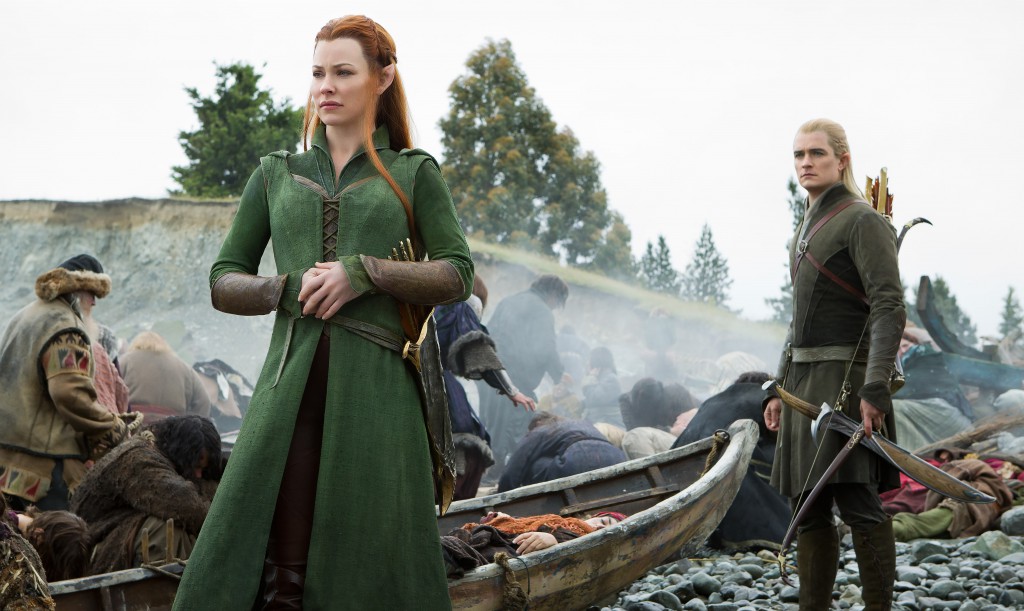
SPEAKING OF TAURIEL . . .
Why this Elf warrior?
"It was really to create dynamics," Jackson said. "We couldn't give up the opportunity of having Thranduil in this movie and having shot his son in The Lord of the Rings, not to actually make Legolas part of the story."
Even the most ardent Tolkien purists have to admit that Legolas had a natural place near his father.
"We just thought this is an opportunity that's too good to miss. So, we wanted to create an Elvish female character partly because of the lack of female characters in The Hobbit and secondly we thought it opens up the story so that it allows us to explore interesting story ideas to do with the relationships between Elves and the Dwarves and the politics within the Elvish world that we otherwise wouldn't get to explore.
"It just allows you to take that relatively simple linear narrative that Tolkien wrote and kind of create subplots and Tauriel is very useful for creating subplots. It allows us to explore other ideas, other things, other aspects of, which I think it will just open up the film and make it more rich. And Evangeline is terrific."
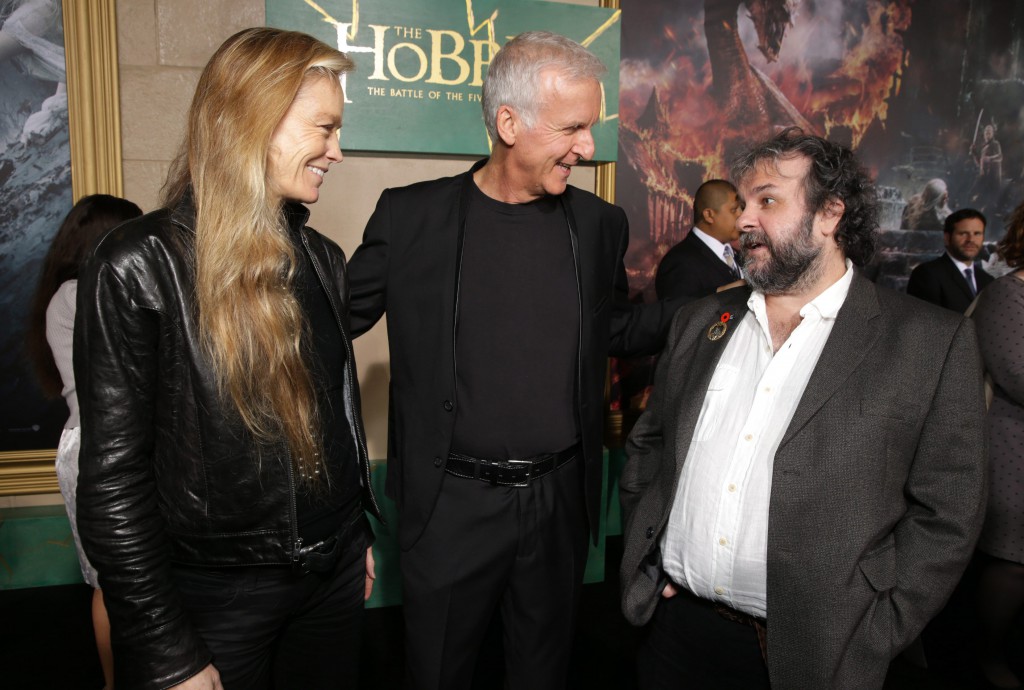
SPIELBERG & CAMERON
Jackson has some pretty interesting peers. He travels in interesting circles with, for example, Stephen Spielberg and James Cameron. The three of them have left permanent footprints in not just film, but culture. They also have made many billions of dollars and won a lot of awards.
Each has pushed the boundaries of digital characters. Spielberg made us believe dinosaurs were real in "Jurassic Park", and that film has earned that praise from Jackson, who in then in turn delivered Gollum. Cameron took him and made giant blue aliens on a completely new planet in "Avatar".
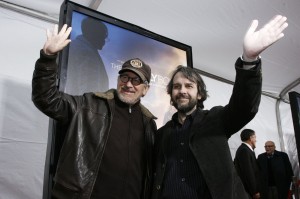
Are there common threads that run through such people?
"Yeah, kind of. Getting to know other filmmakers has been a real joy over the last, I suppose, 25 years. Most of the filmmakers I've seen, I've got to meet and got to know are, we all are kind of similar to each other. We all like a lot of same things. I mean, we're basically big geeks, big kids.
"Jim's a little bit more of scientist than some of us, he's more of a physicist, but he's still a big geek and Steven is a big geek and they're kids at heart. They honestly are. There's not a lot of cynicism and kind of ruthlessness with these people. They're kind-hearted and creative and quite child-like still and I consider myself to be that in some respects. And it's a good thing. I think that's what allows filmmakers like that to tap into their imaginations and not feel self-conscious about it and try to use the excitement of what they're imagining to pass on to other people, to generate the films that they make."
AND WHAT ABOUT JACKSON?
What does Jackson think Jackson does or is that allows him to make these films?

"You've got to remain reasonably patient, you've got to remain reasonably calm, you've got to really be an example. It's just trying to be a good boss really and I don't always succeed in that.
"I can get a little impatient and annoyed when things aren't quite working out properly."
From my five weeks of my observation, this never happened. I never saw him outwardly impatient or annoyed and while I believe him, I suspect it is rare. His calm prevails, very unlike some other great directors. I can reluctantly imagine it in a meeting when things aren't going well but I can't conceive it happening on a set in front of the crew.
"You kind of try to just - you try to set a tone. If there was a guy in this tent who was screaming and yelling and calling people's names and swearing at people, then you know, the mood out there would be a very different mood and the atmosphere coming to work each day would be different.
"A lot of the tone of any work environment is made by the people that are in charge. I think it's important you've got to try and set a tone that allows everyone to do their very best work, because they're all here, all of these people are here to try to help to make the film as good as it can possibly be. They're all here to help me and so I never want to abuse that. I never want to expect things they can't deliver but I always want to try and encourage and push them to the maximum."
That attribute is the thing I admire most from watching him work. He isn't a pushover by any means. He is demanding and sub-par or good enough is never good enough. I watched him send shots back that had been worked on very hard and were thought to be excellent but were sent back to be done again. Jackson doesn't compromise his standards, but he also doesn't compromise his quest to be a good boss.
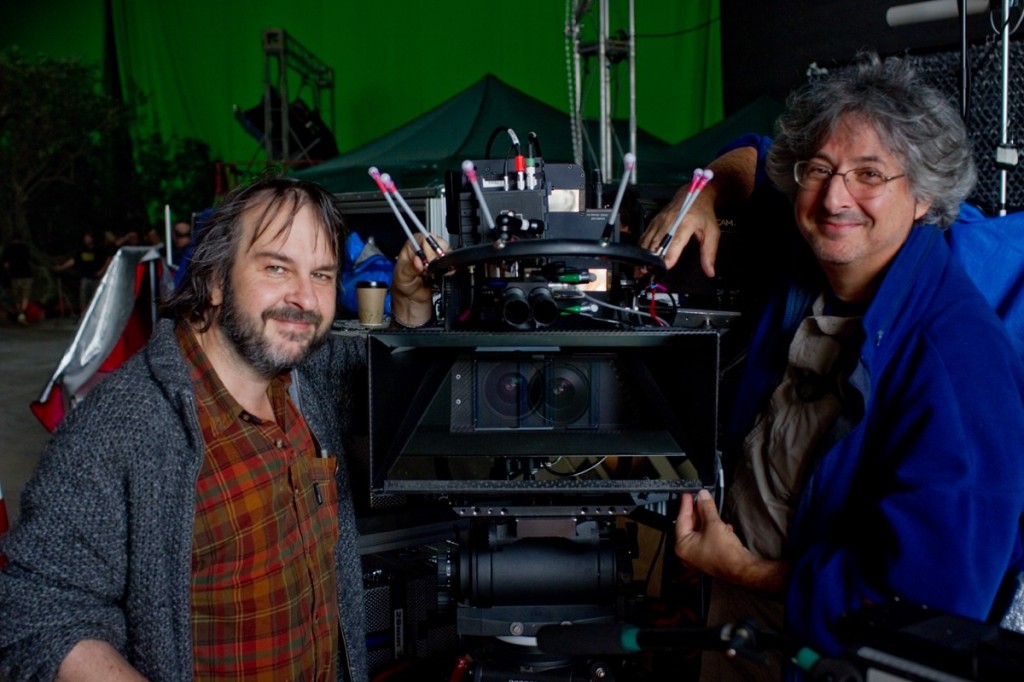
QUICK TAKES: HOW IS THE HOBBIT PRODUCTION DIFFERENT FROM RINGS?
"From the first day that shooting, the postproduction begins. So it's important that that pipeline is as smooth and efficient as possible which is why I juggle my days doing music reviews with Howard [Shore], Weta [Digital] reviews with Eric [Saindon] and editing and doing selects with Jabez [Olssen] here. It's like I'm in postproduction as at the same time as I'm in production and that's kind of how you have to do it really.
"We tended not to do that on The Lord of the Rings films, with Lord of the Rings films we had a year of postproduction for each film, so we literally had an entire 12 months without shooting apart from pickups that we would shoot occasionally. Whereas this movie, a lot of that postproduction has had to happen while we're shooting the film so that we've got the jump on it because we've only got half the length of time once we wrap."
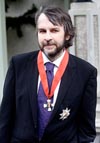
QUICK TAKES: AND HOW ARE THEY THE SAME?
Talking to the cast and crew, there are a lot of folks still around from the work on Rings. There is still that feeling of camaraderie. Did Jackson find that accurate?
"Yeah, sure. You're in a pretty intense work environment where people have to perform to their maximum abilities every day for a year-and-a-half of shooting so you can't help but end up feeling like you're a bunch of troops on a campaign together. You do get a camaraderie, different to when you're doing an 8 or 10 week shoot. It's a very different feel. It is like you become a family, a really, really big family."
QUICK TAKES: ANDY SERKIS
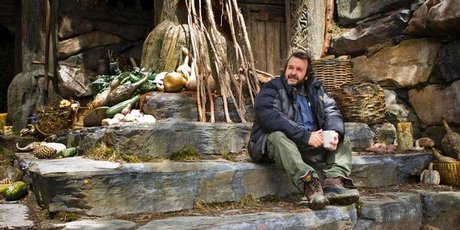
"Andy has been a close friend and colleague since The Lord of the Rings days and through King Kong and through Tintin, so he's someone that he and I have a very good sort of short-hand way of dealing with each other now.
"The thing with Andy that really appealed to me as using him as a second unit director is he's not tentative or conservative, that's the word I want, conservative. He's a sort of balls-to-the wall type guy who will really deliver 110% and I kind of like the idea that that energy is part of the second unit. Plus Andy knows the world, he knows Tolkien, he knows the story. He's also got a relationship with a lot of the other actors and you know the second unit does get to use actors a lot."
QUICK TAKES: TECHNOLOGY
(We talked about technology extensively, enough to do a story on it.)
"This world, we're trying to make this world look real. We're trying to make you feel like you're in it. Every creature we do, Gollum, you know Trolls, Balrogs, we're trying to make everything feel organic and real and the way I direct movies with moving the camera around I try to immerse you in the film.
"There's two sort of experiences you have in a cinema: you can sit in the seat and you're disconnected from the film and you're an audience member and you're kind of there as an observer of the movie. This has to do with script and music and direction and acting and whatever it is, the movie kind of draws you in and you literally, emotionally you're elevated out of your seat and you become part of the film experience and those are the really cool movies. Those are the experiences you remember.
"In the cinema and any technology that can make people leave their cinema seat and kind of drift into the world of the film whether it's 48 frames, 3-D, super big screens, three-dimensional sound, anything that can do that is great, great by me because I don't like the artificial barrier. I want people to pass through it - become part of the movie."
QUICK TAKES: THE END OF ALL THINGS
"There is a little bit of sadness. I'm actually liking, I'm enjoying shooting this movie so much that I am feeling a bit sad. I wouldn't say that I want to shoot Middle-earth movies for the rest of my life, but...certainly there aren't any more films in the offhand because the Silmarillion is still very much sitting within the Tolkien estate."
NOTE: Big thanks to the editors, transcriber, publicity folks at WB and Wingnut and especially to Peter Jackson for halting a multi-million dollar project to talk with TheOneRing.net. Maybe someday we will bring you the Extended Edition of this interview.
(This post was edited by dernwyn on Dec 17 2014, 5:27am)
|
|
|

adt100
Rohan

Dec 16 2014, 5:24pm
Post #2 of 5
(1406 views)
Shortcut
|
|
Brilliant article and great insight into PJ's thoughts on the process.
[In reply to]
|
Can't Post
|
|
It's always refreshing to read such articles, unlike many in the mainstream media that have the same predictable questions and much of the information given is 'pr speak' or comments that are very 'standard' shall we say.
It's reading such comments from PJ that you begin to realise in part just how much of a difficult task bringing these films to the big screen really is. It also answer many of the questions people have relating to motivations and reasoning behind certain decision he makes and TC/EE scenes etc.
|
|
|

SirDennisC
Half-elven

Dec 18 2014, 6:04am
Post #3 of 5
(1295 views)
Shortcut
|
Thanks Larry for a fantastic piece, and for being a "balls-to-the-wall" kind of interviewer.
Thank you too to Sir Peter and the powers that WB for the generous gift of time to our surrogate fan.


|
|
|

Silverlode
Forum Admin
/ Moderator

Dec 18 2014, 6:51am
Post #4 of 5
(1295 views)
Shortcut
|
I'm always fascinated by these behind-the-scenes glimpses of the people and the process.
Silverlode

Want a LOTR Anniversary footer of your own? Get one here!
"Dark is the water of Kheled-z�ram, and cold are the springs of Kibil-n�la, and fair were the many-pillared halls of Khazad-d�m in Elder Days before the fall of mighty kings beneath the stone."
|
|
|
|
|









 SETTING THE SCENE
SETTING THE SCENE 

 "Well, battles in a way, they have a personality and a characteristic of their own based on who's participating in the battles, what the goal is, what the location is, who the armies are."�
"Well, battles in a way, they have a personality and a characteristic of their own based on who's participating in the battles, what the goal is, what the location is, who the armies are."� 






















